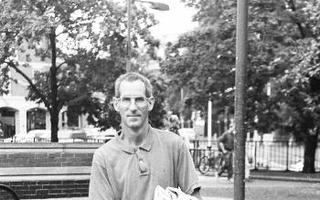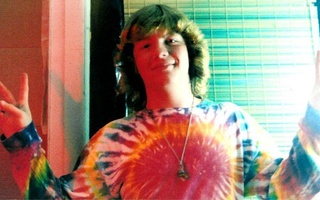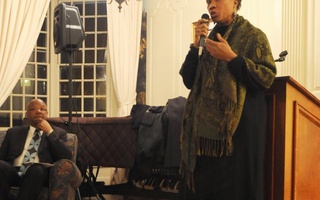Bhagawan Dass told him what and when to eat, when to sleep, who to speak to, what to think. When Alpert complained about his pains or him hunger Bhagawan Dass silenced him. "Let the feelings disappear like waves," he would say. When Alpert talked about plans or speculated on the future. Bhagawan Dass stopped him. "The future is now," he would say. When Alpert began some anecdote from the past, Bhagawan Dass refused to listen. "Be here now," he would say firmly, and that was all. He lived in a perfect pure present.
Once when Alpert's complaints came as close as they ever did to ruffling his composure, Bhagawan Dass's lips began to move and a rumbling chant became audible, OM MANI PADME HUM, OM MANI PADME HUM, OM MANI PADME HUM, over and over, not a demonstration for Alpert's sake but the repeating aloud hundreds of times of this sacred mantra, a chant that more people are reciting silently or aloud every moment than any other words in the world.
Bhagawan Dass told Alpert how to recite it over and over until he could stop saying it aloud or even thinking it in his mind, how it could become an autonomous voice continuing without cease no matter what thoughts were going through his mind and no matter whether he were sleeping or awake. Once it became autonomous, he said, Alpert by meditating on it would be able to hear the voices of the millions of others who have repeated it through the ages like the sound of the ocean in a seashell. It was like saying "Be here now, be here now" over and over, though the Hindi words have a more complex meaning relating to the manifestation of divinity in the oneness of the universe.
So they continued through India, finding shelter in temples and monasteries, or at the homes of people they met on the way. Bhagawan Dass never spoke of his past, but Alpert inferred from the receptions they got that the boy was well known among the religious people of the regions they passed through. Everywhere he was greeted with open arms and taken in by a multitude of different sects as one of their own. His knowledge of esoteric doctrines and rituals was immense. At night Alpert lay meditating on his mantra, summonning the rolling sound of the countless faithful just before he fell asleep, but Bhagawan Dass sat up meditating crosslegged through most of the night. He slept little.
Alpert learned much from the boy, but he began to get tired of wandering through India. Bhagawan Dass had taught him that the happiness he was looking for was not something to be sought after or prepared for or snatched at as it fluttered by like a butterfly. No happiness, peace, understanding, the end of striving, the feeling for which there are no words--it already existed in its fullness within him, existed already and always in each moment of life, existed in perfection waiting for his surrender. Still, Alpert made plans to leave India and join Alan Watts in Japan. He figured he had gone as far as he could with Bhagawan Dass. Though the feeling was barely there, he had the knowledge he needed. The feeling would have to come of itself.
He told Bhagawan Dass and the boy said he would go with him to the city since he had to have his papers processed. That night Alpert went outside of the place where they were sleeping to take a piss under the stars. He looked up at the sky and thought of his mother, who had died a year before from a disease that made her spleen swell up and burst. He didn't think anything particular, just had a passing, general remembrance of her and went to bed without another thought.
In the morning Bhagawan Dass said he wanted to go up in the hills to see his guru before they went to the city. This was certainly strange. In India the word "guru" is not bandied about. It is a special term used only for the holiest of sages and only for the individual's particular spiritual teacher. Bhagawan Dass had never before said that he had a guru.
All the same, Alpert was in no mood to fool around with another mystic. He had seen enough already and his feet hurt. His decision made, he was anxious to leave and get it over with. He didn't want to waste time with another excursion into the hills. But Bhagawan Dass was adamant. He told Alpert to go to the house of a friend who had a Land Rover and borrow it for the journey. Alpert said the friend had already done enough for them and would refuse to part with it. But when Alpert obeyed the boy's instructions and went, the friend offered the car before Alpert asked. "You are going to see Bhagawan Dass's guru? Excellent! Why don't you take the Land Rover?" he said immediately. It was strange.
When they approached the place where the guru stayed, Bhagawan Dass said to leave the car by the roadside out of sight. They walked the rest of the way, rounding several bends and always ascending. They came finally to a small hill atop which an old man sat surrounded by many Indians. Bhagawan Dass set out in a lope up the hill and Alpert followed panting and cursing under his breath. The boy fell on the ground in front of the old man and embraced his feet, tears streaming down his face, the first display of emotion Alpert had ever seen in him. The old man patted the boy's head and beckoned to Alpert, who stood awkwardly off to the side. He was a small man of about 70, spry, his voice commending and his face radiant.
"You came in a car," he told Alpert through an interpreter. Alpert was surprised. There was no way the old man could have known about the Land Rover. It was far away out of sight and Alpert knew Bhagawan Dass hadn't told the old man about it.
"Will you give it to me?" the old man asked mischievously. Alpert knew that game. He had seen plenty of so called holy men welch the faithful out of their possessions. He kept the disdain out of his voice as he explained that he didn't own the car.
The old man took a nee tack.
"You were thinking of your mother last night," he said. Alpert stared at him. "She died a year ago," the old man said. "She got a very big stomach. She died of spleen."
Alpert's mind went blank. Like a machine that has exhausted its capacity and abruptly stops, his mind, his civilized, Western, rational mind, in that instant straining to the utmost for an explanation, found that nothing in the world as he knew it could account for had happened and just went dead. A great pain wrenched his chest and he began to sob. Home sure was strange.
II
Read more in News
New Starters Lead Nine To 7-4 Win Over M.I.T.Recommended Articles
-
Rising State at HBS Opts Out of Rat RaceAt the end of Mark S. Albion's '73 first year at Harvard, his father came to visit him while attending
-
 A Roller-Coaster Year for Dining Halls
A Roller-Coaster Year for Dining Halls -
Golan to Donors: ’Tis Better To Give for the Arts Than To ReceiveWhen milling around outside his Wigglesworth Hall entryway one spring afternoon in 1975, first-year Jay E. Golan ’78 caught a
-
 Harvard, LSD, and the 1960s
Harvard, LSD, and the 1960s -
 Former Mayor Simmons To Run for Senate
Former Mayor Simmons To Run for Senate -
Need Help with Your Schedule?The entire drug classification system is archaic, unscientific, and rather harmful.













